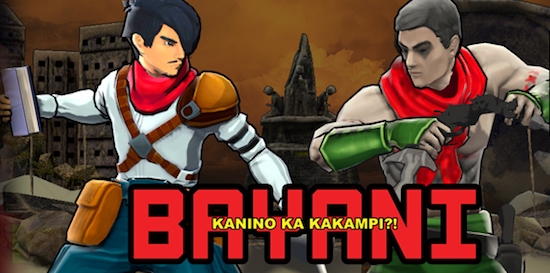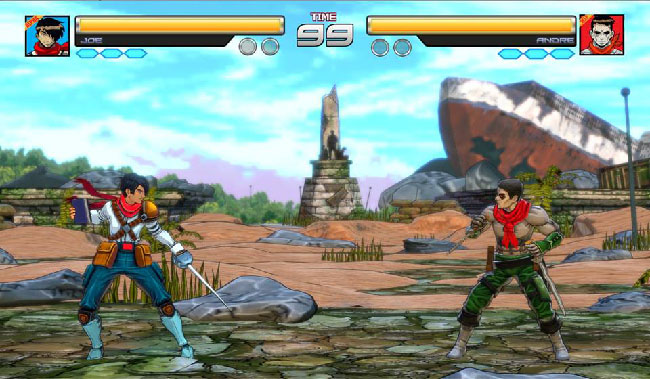To possibly and literally attack a colonizer with a book, keep an eye out for the Filipino fighter Bayani: Kanino Ka Kakampi?!, recently showcased at IndieCade 2018.
At the Santa Monica College Center for Media and Design, IndieCade attendees could duel each other in the Philippines-based Ranida Games’ Bayani demo, with a gallery of the playable characters nearby. Each illustration from the gallery included a bio for an in-game fighter, and for the real-life hero that inspired the creation of that fighter.
Ben Banta, who serves as the President, CEO, and Head of Games at Ranida Games, explained that Bayani is based on national heroes of the Philippines.
“But not true stories,” Banta said. “This game has its own lore.”
Philippines-based GMA News Online reports that artist Anthony Dacayo first created fighter versions of Filipino national heroes, sharing them on Facebook.
“Around that time, the Heneral Luna movie was getting a lot of hype,” Dacayo said in an interview with GMA. “So my illustration of Antonio Luna went viral, and got around 14,000 shares in one month.”
Historically-Based Bruisers
According to GMA, Dacayo’s art drew the attention of Ranida Games. The studio approached him, wanting to collaborate on a game project. Their partnership eventually created Bayani.
The game’s website explains that the story is in an alternate timeline.
Banta said playable fighters were based on the personalities and actions of Filipino national heroes, on their history.
For example, real-life revolutionary figure Jose Protasio Rizal was—among other things—a fencer, and the game version of him, Jose “Joe” Maria H. Rizal, fights with a sword too.
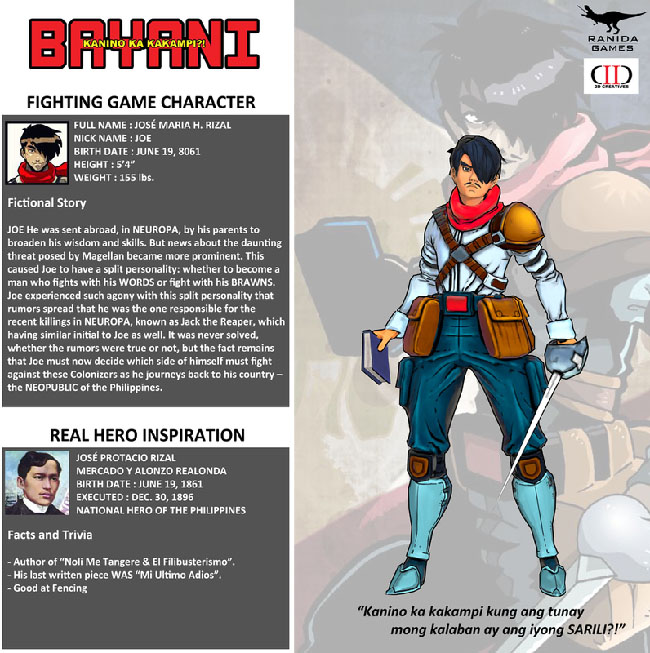
This bio for playable character Joe and his real-life inspiration Jose Rizal is found on the game’s website, along with bios for the other fighters and the different historical figures that inspired them.
Banta described the process as “bits of history turning into digital information.”
According to Banta, the game will even include a feature where relics can be collected, with each of them further informing the player.
Banta gave an example, explaining that these items can share a tidbit about Jose Rizal’s writing that helped inspire revolution in the Philippines. This also clarifies why his game counterpart, Joe, can literally fight with a book along with his sword on the battlefield.
“We are adding hints of history in the game, but not really in-your-face historical education,” Banta said. “Get kids curious enough to check them out.”
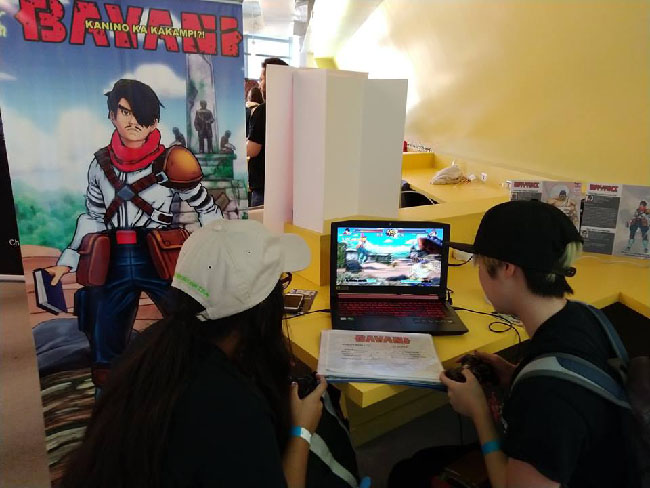
At IndieCade 2018, attendees try out Ranida Games’ demo. Banta broke down some of the English translation of Bayani: Kanino Ka Kakampi?!, explaining that “Bayani” means “heroes” in the Philippines, and “Kanino Ka Kakampi” means “choose your side.”
Banta said not all the characters will be Filipino. Some will have helped during the revolutionary war in the Philippines. And others will be the colonizing forces.
“We were colonized by Spain, Japan, and the U.S.,” Banta said, describing the history of the Philippines. “They are like the villains [in the game].”
For example, the real-life Magellan, who served the king of Spain and began conquering the Philippines, will be represented by a completely villainous character in Bayani.
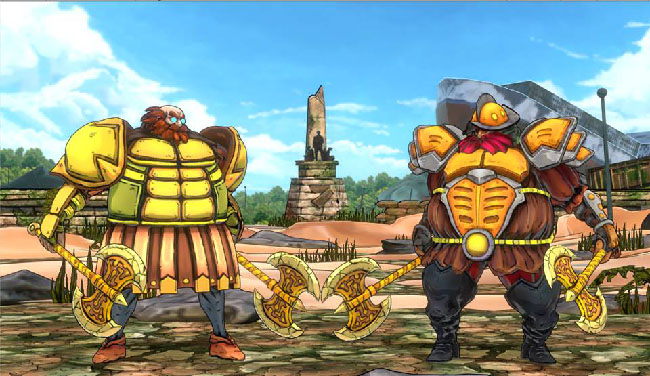
Developmental art exploring the fighting game version of the real-life Magellan in Bayani: Kanino Ka Kakampi?! by Ranida Games.
According to Banta, Ranida Games plans to include 32 playable characters in Bayani, and is scheduled for a 2019 release on Steam.
GMA reports that fighters will include Oria (based on Gregoria Alvarez de Jesus), Hen. Anton (based on Antonio Luna), Leon (based on Emilio Aguinaldo), Rio (based on Apolinario Mabini), and Lolang Tsora (based on Melchora Aquino de Ramos).
Talking Tactics
Ranida Games partly chose to do a fighting game based on historical figures from the Philippines out of a desire to stand out.
“It’s because it’s a different medium, no one had created a fighter about this subject,” Banta said.
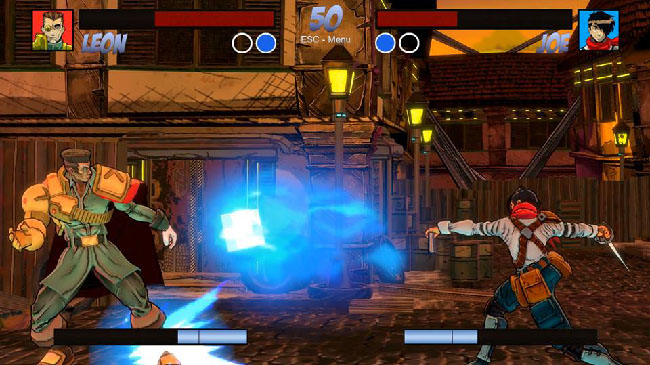
Playable characters Joe vs. Leon.
Banta also said that a fighting game would better represent the characters.
According to him, if it had been a platformer, there wouldn’t be much emotional investment in the characters. But Banta said that in a fighting game, players will pick the best character they want, and will spend time on that character.
Besides drawing from history, how much is Bayani inspired by other fighting games?
“A lot. A lot,” Banta said. “Mostly anime fighting games. Like Dragon Ball, BlazBlue, Guilty Gear, Rising Thunder as well, and Street Fighter.”
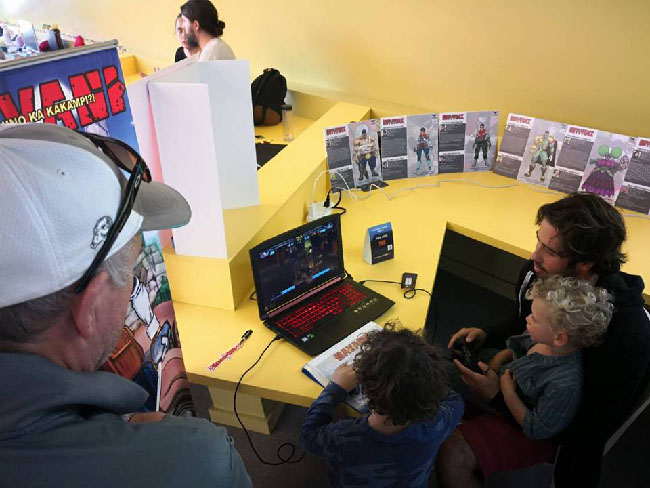
Another set of IndieCade attendees play the fighter demo.
Banta shared that special mechanics were also added into the game. For example, there’s what he called the “break mechanic.” Banta described it as something that the player could use for both offense and defense.
“There are small tweaks in gameplay we added to give a special touch,” Banta said.
Competition Builds Community
Ranida Games wants to do even more with Bayani as a competitive fighter, planning for esports.

Banta said the logo and name for his studio comes from an inside joke. He shared that one of the game designers on the team is very fearful of frogs, as if they were as threatening as a T-Rex. Hence the image of a T-Rex with a long frog-like tongue. As for the name, it was inspired by ranidaphobia, or the fear of frogs.
Though Banta said it’s a long way off, he explained that they want to do esports as a way to engage with the community. According to Banta, that means having Bayani played at tournaments in Filipino esports, which already have people competing in DotA and League of Legends.
“We wanted a locally made game for that,” Banta said. “And not just locally made, but based on our history.”
In fact, Banta hopes for a future where esports in the Philippines will host other locally made games, not just Bayani.
“Our gaming industry really needs to grow, and for that, we need the support of the local community,” Banta said.
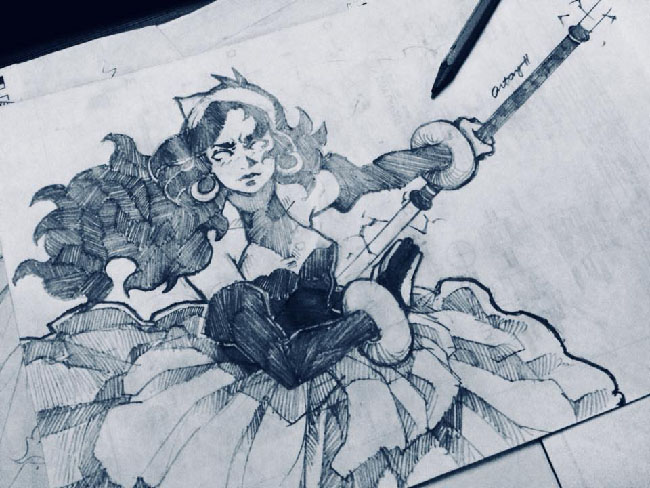
Art of another fighter, Oriana “Oria” L. De Jesus. She’s based on real-life figure Gregoria Alvarez De Jesus, who was the Vice President of the women’s chapter of the Katipunan, a revolutionary organization that opposed Spanish colonization.
Ranida Games is developing Bayani as an example to engage that community.
“We wanted to let Filipinos know we are capable of making games,” Banta said. According to him, the majority of the Philippines is not familiar with local game development projects.
“We wanted to be able to showcase that we can create games that can compete with the foreign ones they are playing,” Banta said.
Based on this Twitter post, Ryan “Filipino Champ” Ramirez, an esports player specializing in fighting games and Ultimate Marvel vs. Capcom 3 winner of the 2012 Evolution Championship Series, has been involved with Bayani. According to additional posts on Twitter and Facebook, Ramirez consulted on the game and provided feedback as well.
